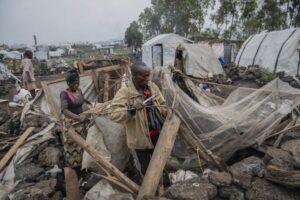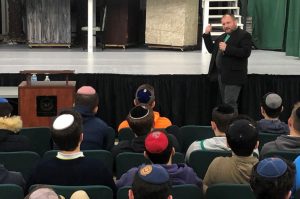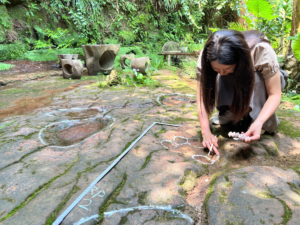— and trauma Christianity tore Native American families apart but unites us in celebrating as well.
Julian Brave Noisecat, standing in the back row holding his godson Kaleb Archie, and his cousins gather for a family photo at Christmastime.Alexandra RoddyDec. 25, 2019, 4:30 AM ESTBy Julian Brave NoiseCat
This Christmas, as on many before, I’ll be visiting family in Canim Lake, a small Indian reserve of fewer than 400 residents, almost all members of the Secwepemc Nation, about a seven hours’ drive northeast of Vancouver in the forested interior of British Columbia. And as at every other Christmas, I’ll decide whether I’ll attend Mass with my kyé7e (the Secwepemc word for grandmother, pronounced “kya-ah”) or stay away, instead playing games and watching hockey with my cousins. It’s a decision grounded in the painful legacy of the church in our community and many other indigenous communities like ours, where Christianity tore families apart but somehow still brings us back together.
For as long as our people have been confined to a tiny reserve at Canim Lake, we have gathered in church to celebrate the Big Day in all its ambivalence.
At Canim Lake, the church stands at the center of a small plot known as Indian Reserve One in government documents, but which we colloquially call the “Main.” It sits beside the old cemetery where many of my ancestors are buried, including Alice Newísket, my great-grandmother, whose last name I carry. Although faith is declining in Canim Lake, the church remains the heart of our community. But the heart is a wily organ. It speeds up, slows down and starts to falter when it ages. Its faith can be steady, but it can also be broken. And sometimes, it needs to be replaced so that the body can survive. Christmas, an end-of-year soul-searching about how our past continues to pulse through our present, calls these conflicting rhythms to the fore.
My kyé7e became a devout Catholic both because of and despite that past. When she was a child, she was taken from Canim Lake on the back of a cattle truck to the St. Joseph’s Indian Mission, a residential school for Native children established by the Catholic Church with the support of the Canadian government 100 miles away in Williams Lake. There were hundreds of schools just like St. Joseph’s across Canada and the United States and around the world designed to cleanse “heathen” Indigenous souls, convert us to Christianity and prepare us for lives of low-wage labor and servitude.
Abuse abounded in these schools. In 1989, Harold McIntee, a priest at St. Joseph’s, pleaded guilty to sexually assaulting 13 boys, whom he attacked in the dormitory and lured to the showers — some as many as 20 times. And McIntee was far from the only one. The Truth and Reconciliation Commission of Canada found that death rates for children in the residential schools were nearly five times those of the general population, and that 1 in 5 students were victims of sexual abuse. Statistics for Native American boarding schools in the United States are less reliable but no less damning. Sometimes I wonder why my kyé7e, a survivor of these schools, is still a devout Catholic. But then, how could I trouble her with such a painful question?
Although my father was born in the St. Joseph’s Mission, he hasn’t attended a service for decades. He has renounced the church for what he views as its role in perpetuating genocide, slavery and colonization. I myself believe in a Creator, but I did not grow up Catholic because my father rejected his mother’s faith long ago and my own mother is an Irish-Jewish New Yorker — so about as secular as they come. When my aunt and uncle made me the godfather to my cousin Kaleb six years ago, the church in Canim Lake refused to recognize the honor.
Although much of this history is, thankfully, behind us, Christmas today has become yet another battleground in our escalating culture war. Conservatives insist there is a sinister plot afoot to replace expressions of Christian merriment with pronouncements of a more pluralistic holiday cheer — for them, yet another sign that they’re losing their country. (I find this sentiment deeply ironic, for obvious reasons.)
Liberals, meanwhile, haven’t so much embraced tolerance as they’ve abandoned organized religion altogether. With the notable exceptions of the Black and Latino communities, the right wing now holds a monopoly on the church.
As the troubling history and present of Christianity specifically — and organized religion more generally — has become apparent to many, this is perhaps unsurprising. Many churches are opponents of climate science, LGBTQ rights and a woman’s right to choose. These houses of worship remain complicit in much suffering. During the 2016 election, self-identified white evangelicals were, statistically speaking, a core part of the Trump base. It’s getting increasingly difficult to disentangle Christmas from the church, the culture war and our divisive politics.
My family and many others still live with the pain inflicted by the government and the church. Recent epidemiological studies suggest that trauma alters our chromosomes and is even passed down through the generations. The Christmas holiday serves as an annual reminder of these inherited wounds. To cope, we tell and retell colorful, raw stories of Christmas transgressions and Masses gone wonderfully awry so we can smile and laugh. It takes a little weight off.
There was the year when, as the tithings bowl went around the pews, my late Uncle Tommy burst into the church, dug into his pocket, pulled out a handful of change and chucked it at the priest. There was another time when a young man stumbled in the door crying and repeating as he sobbed: “’cused me of stealing Christmas presents.”
It is impossible to gather round as families, communities and nations without deep contradictions and even trauma. And sometimes, it is the trauma that gathers us around.
More recently, there’s the annual sight of children, some as young as 4, singing carols in our ancestral tongue, which not so long ago the church literally tried to beat out of us. My kyé7e and her sister, also a devout Catholic, are the little ones’ teachers.
Maybe some messiness, in families and histories, is good for the soul. In our Secwepemc language, the term for Christmas is “Xyum te Sítq’t,” which means “Big Day.” And for as long as our people have been confined to a tiny reserve at Canim Lake, we have gathered in church to celebrate the Big Day in all its ambivalence, praying to a God forced upon us, beside ancestors and relatives converted to a faith from a foreign land, singing and sometimes even praying in a language the priests and nuns tried to kill.
It is impossible to gather round as families, communities and nations without deep contradictions and even trauma. And sometimes, it is the trauma that gathers us around. I think this year, I’ll go to church with my kyé7e.Julian Brave NoiseCat
Julian Brave NoiseCat is vice president of policy and strategy at Data for Progress, senior media fellow with NDN Collective and narrative change director of The Natural History Museum.




